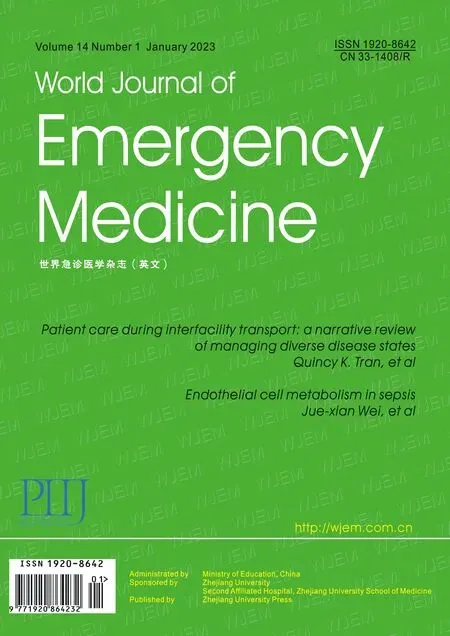Modified qSOFA score based on parameters quickly available at bedside for better clinical practice
Qi-fang Shi, Jin-song Zhang
Department of Emergency Medicine, the First Affiliated Hospital of Nanjing Medical University, Nanjing 210003, China
Dear editor,
We thank Hai Hu’s team for their work in modifying the qSOFA scores.[1]This study has aroused great interest among researchers.[2]As we all know, the advantage of qSOFA score is that it contains bedside parameters that can be collected quickly, and it is still helpful in low- and middle-income countries. However, the disadvantage of qSOFA score is the poor performance in predicting the prognosis of sepsis. Combination with some other parameters might improve the prediction performance of qSOFA score. The most parameter could be searched in PubMed is lactic acid. However, lactic acid requires time-consuming laboratory tests. The modified qSOFA (MqSOFA) score is a revised version of the qSOFA score by adding the SpO2/FiO2ratio (S/F). It also seems that the combination parameters of qSOFA score should be collected quickly at bedside, and S/F might be a potential choice. From our point of view, the following issues shoud also be considered.
The cut-offvalue of S/F was based on a previous study (published in 2007) of the linear relationship between S/F and PaO2/FiO2(P/F). However, a recent study showed that the relationship between S/F and P/F is non-linear. When SpO2>96%, the PaO2estimate is not reliable, and S/F may be difficult to identify mild ARDS.[3]Thus, it is necessary to explore the optimal cut-offvalue of S/F.
Shock index (SI, heart rate [HR]/systolic blood pressure [SBP]) is another parameter which could be considered for a revised qSOFA score. SI is derived from the vital signs, it is not only positively correlated with lactic acid,[4]but also can predict sepsis mortality.[5]
Establishing a revised qSOFA score may help to improve the predictive ability and clinical practice. The bedside available parameters should be considered for modification. It is necessary to conduct prospective large cohort studies to verify the revised qSOFA score.
Funding:None.
Ethical approval:Not needed.
Confl icts of interest:None.
Contributors:All the authors drafted the manuscript, and contributed substantially to its revision.
Authors’ reply
We are honored that you can focus on our team’s research. The issues you mentioned in your letter are very meaningful.
Our study compared different versions of revised qSOFA score, such as the LqSOFA (included lactate), the MqSOFA (included SpO2/FiO2ratio), and the PqSOFA (included procalcitonin [PCT]). Although our study suggested that the area under the ROC curves of the three scores were similar, further prospective research is still needed. In addition, the performance of a revised qSOFA score with bedside lactic acid needs to be evaluated. We also believe that a revised qSOFA score with SI might be valuable.
In conclusion, the modification of qSOFA should consider rapidity, availability, and accuracy at the same time, and find a balance between them. We strongly agree with the view that a prospective large cohort study should be conducted to evaluate different versions of the revised qSOFA score.
 World journal of emergency medicine2023年1期
World journal of emergency medicine2023年1期
- World journal of emergency medicine的其它文章
- Hyoscine N-butylbromide inhalation: they know, how about you?
- Occurrence of Boerhaave’s syndrome after diagnostic colonoscopy: what else can emergency physicians do?
- A case of chemical eye injuries and aspiration pneumonia caused by occupational acute chemical poisoning
- A case of unusual acquired factor V deficiency
- A case of persistent refractory hypoglycemia from polysubstance recreational drug use
- Cardiogenic shock and asphyxial cardiac arrest due to glutaric aciduria type II
